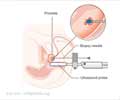A new study looked at screening practices among healthcare providers and the incidence of prostate cancer to identify any changes in the number of new prostate cancer diagnoses.

Cancers diagnosed in the National Cancer Database between January 2010 and December 2012 were analyzed to get monthly trends in new prostate cancer diagnoses both before and after the task force guidelines were issued. They compared these trends with those of colon cancer.
In the month after the USPSTF draft guidelines were issued, the number of overall prostate cancer diagnoses fell by more than 12%, and diagnoses continued to fall for a further 11 months.
Researchers observed that the benefits identified as a result of the new guidelines were a reduction in overdiagnosis and overtreatment of low-risk disease and disease found in elderly men. The harms were missed opportunities to diagnose cases in men who may benefit from the treatment.
Source-Medindia










![Prostate Specific Antigen [PSA] Prostate Specific Antigen [PSA]](https://www.medindia.net/images/common/patientinfo/120_100/prostate-specific-antigen.jpg)




